- 7 Top Flite Golf Clubs XL for Improved Performance - September 28, 2024
- Top Flite Golf Clubs: Top 5 Reasons to Choose Them - September 28, 2024
- Top 3 Golf Club Fitters for a Perfect Swing - September 28, 2024
You're cleared to use a golf chipper in professional tournaments, as the USGA and R&A permit their use in competitions according to the Rules of Golf. Chippers are legal and can offer an advantage in chipping and pitching. While they're not commonly seen in professional play, their design features can benefit certain shots. Now that you know chippers are allowed, you're probably wondering how they impact strategy and competitive edge – or maybe you're curious about the stigma surrounding their use among professionals.
Key Takeaways
- USGA and R&A permit golf chippers in professional tournaments, as Rules of Golf do not prohibit their use.
- Chippers offer a legal advantage in chipping and pitching, and clear rules in the United States allow their usage.
- Chipper adoption varies among players due to personal preferences, and design features like putter grip and upright face benefit certain shots.
- Chippers are legal in professional tournaments, but their use can impact strategy and competitive edge, and are not commonly seen in professional play.
- Compliance with equipment regulations is crucial to avoid penalties, disqualification, and reputational damage.
Golf Chipper Rules and Regulations
According to the governing bodies of golf, the USGA and R&A, golf chippers are explicitly permitted for use in professional tournaments, as the Rules of Golf don't contain any specific provisions prohibiting their use. This means you, as a professional golfer, can confidently include a chipper in your bag for specific shots during tournament play.
The Rules of Golf don't outlaw chippers, making them a permissible club choice in professional competitions. You can utilize this club for chipping and pitching situations on the course, giving you an edge in your game. While some players may opt not to use chippers, they remain a legal and viable club option for all golfers.
In United States Golf, the rules of golf are clear: chippers are allowed. This clarity allows you to focus on mastering your game, knowing that your club choice is within the rules. With this knowledge, you can strategically select your golf clubs to optimize your performance and take your game to the next level.
USGA History and Championships
As you take advantage of the rules permitting golf chippers, you may be interested in exploring the rich history and prestigious championships governed by the USGA.
Formed in 1894, the United States Golf Association (USGA) has been the governing body for golf in the United States, overseeing iconic championships like the U.S. Open and U.S. Women's Open.
The organization conducts 10 national amateur championships, including the U.S. Amateur and U.S. Women's Amateur, showcasing the best of amateur golf.
Beyond individual competitions, the USGA also hosts team championships, such as the U.S. Amateur Four-Ball, and is involved in international team competitions like the Curtis Cup and Walker Cup.
In recent years, the USGA has expanded its championship offerings, adding the U.S. Senior Women's Open in 2018.
As you explore the world of golf chippers, understanding the USGA's history and championships can deepen your appreciation for the game.
Chipper Legality in Professional Tournaments
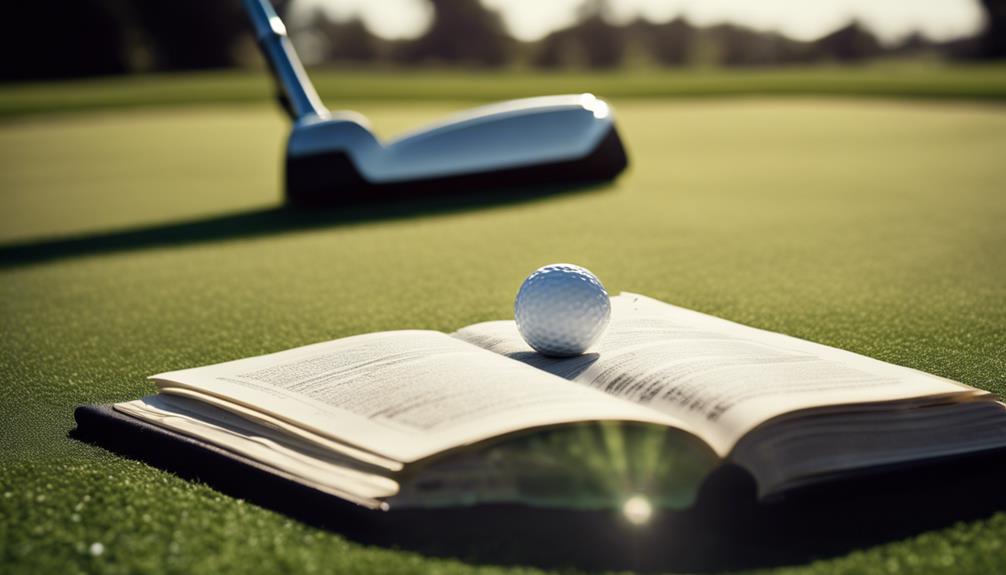
When you step onto the professional golf tournament stage, you'll find that chippers are, in fact, legal for use under USGA rules. While you mightn't see them frequently in play, chippers aren't prohibited from use in professional tournaments. However, their adoption varies among players due to traditional techniques and personal preferences. The decision to use a chipper rests with you, the individual player, and can greatly impact your strategy and approach to specific shots.
In terms of design, chippers often feature a putter grip and a more upright striking face, which can be beneficial for certain shots. Despite their legal status, chippers aren't commonly seen in professional play. This is largely due to the fact that many players prefer to stick with traditional methods and clubs.
Nonetheless, the rules apply equally to chippers as they do to other golf clubs, and their use is ultimately up to you. As you weigh your options, consider how a chipper might fit into your overall game plan and help you gain a competitive edge.
Illegal Golf Clubs and Equipment
Detecting illegal golf clubs and equipment is a significant concern in professional tournaments, where a single infraction can lead to severe penalties and reputational damage. You need to be aware of what constitutes illegal golf equipment, including non-conforming grooves, adjustable weight clubs, and oversized clubheads.
The use of clubs with a spring-like effect, anchor putters, and steel shafts can lead to disqualification in tournaments. Additionally, the British ball, illegal drivers with flexible heads, and U-shaped grooves in wedges are also prohibited. If you're caught using illegal equipment, you'll face consequences such as loss of amateur status, potential fines, suspension from play, and public scrutiny.
To guarantee compliance, detection methods are in place, including X-ray technology, R&A and USGA regulations, testing at tournaments, spot checks, and increased scrutiny on professional tours. It's important to understand what's allowed and what's not to avoid any issues during a tournament.
Impact of Illegal Equipment on Golf
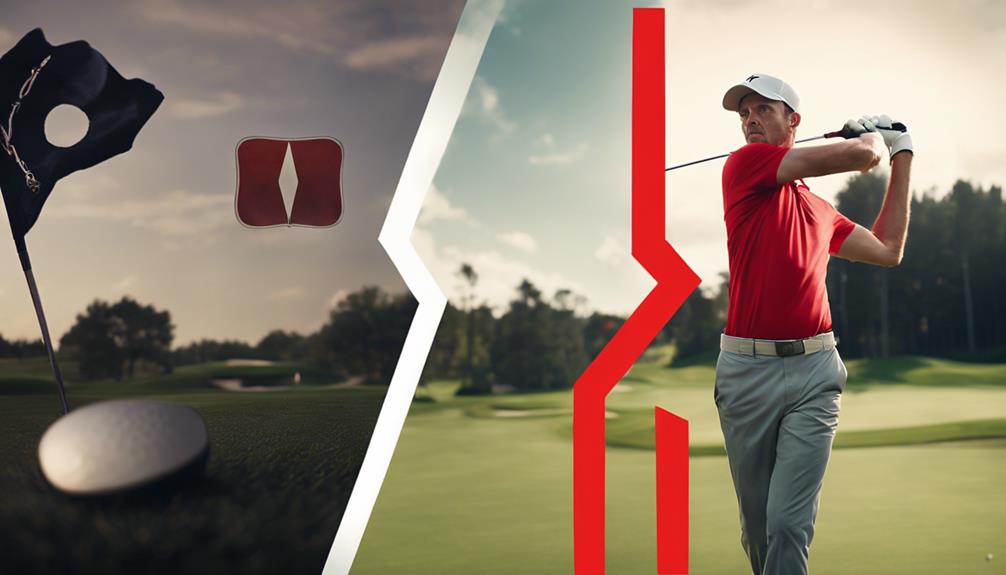
Using illegal equipment in golf can have a profound impact on your game, leading to disqualification, penalties, and reputational damage that can be difficult to recover from. If you're caught using non-compliant clubs, you'll face severe consequences that can affect your career and personal brand. Just minutes ago, you might've been on top of your game, but a simple mistake can bring it all crashing down.
You've never hit a shot that felt so good, only to realize the club you used was illegal. The detection methods used by tournament officials are sophisticated, and they'll catch you eventually.
The R&A and USGA take equipment compliance very seriously, and you should too. Remember, the reputation you've built over years can be tarnished in an instant if you're found to be cheating. Don't risk it – make sure your equipment is compliant, and you'll avoid the devastating consequences that come with using illegal gear. Your game, and your reputation, depend on it.
Detection and Testing of Illegal Clubs
Tournament officials utilize advanced detection methods, including X-ray technology, to scrutinize club components and verify compliance with strict regulations. You might wonder how they do it – it's quite fascinating.
As you prepare for your next tournament, you should know that the R&A and USGA have established specific regulations for club testing and approval. Hours ago, you might've been practicing with your reliable golf chipper, but did you know that it could be subject to spot checks during the tournament? Officials take equipment rules seriously, and increased examination on professional tours ensures that everyone plays by the book.
When you're on the course, you might notice officials examining clubs, paying close attention to details like the circular grip. They're not just being thorough; they're upholding fairness and integrity in golf competitions.
Legal Alternatives and Compliance
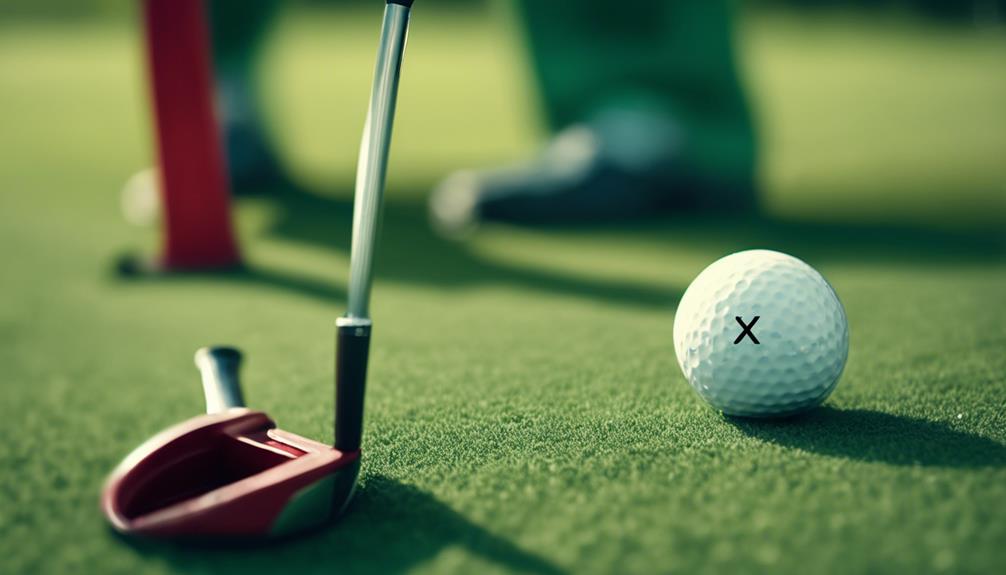
Your awareness of legal options for non-conforming equipment can be a game-changer in maintaining compliance with professional tournament regulations. As you prepare for your next tournament, familiarizing yourself with equipment alternatives that meet the USGA Rules of Golf is crucial. Seeking guidance from golf professionals can offer valuable compliance clarification, assisting you in making informed decisions about your equipment choices.
Regular equipment checks are carried out to ensure adherence to golf rules, so staying updated on rule changes is vital to uphold compliance. By doing so, you'll feel confident in your tournament readiness. Remember, using conforming equipment is necessary for compliance in professional tournaments. Don't risk disqualification – take the time to explore legal options and verify that your equipment meets the required standards.
With the appropriate knowledge and preparation, you'll be well on your way to a successful tournament. By emphasizing compliance, you'll be able to concentrate on what's most important – your game.
Legal Golf Equipment Options
When it comes to legal golf equipment options, you'll find a range of high-quality clubs that meet USGA standards, including the 52-degree wedge by BombTech, a popular choice among golfers. This wedge offers exceptional performance at an affordable price, making it an attractive option for those seeking chipper performance without compromising on professional acceptance.
You can trust BombTech for legal and compliant golf equipment that meets the highest standards, ensuring tournament legality. In fact, you can directly order their legal clubs from their website, making it easily accessible.
With BombTech, you can expect impressive quality and performance from their wedges. Their 52-degree wedge, in particular, has gained popularity among golfers due to its exceptional design and construction. By choosing BombTech, you can rest assured that you're getting a product that not only meets but exceeds USGA standards.
This means you can focus on perfecting your game, knowing that your equipment is tournament-ready. Whether you're a professional or an enthusiast, BombTech's legal golf equipment options provide the perfect blend of performance, quality, and compliance.
Legality of Chippers in Golf
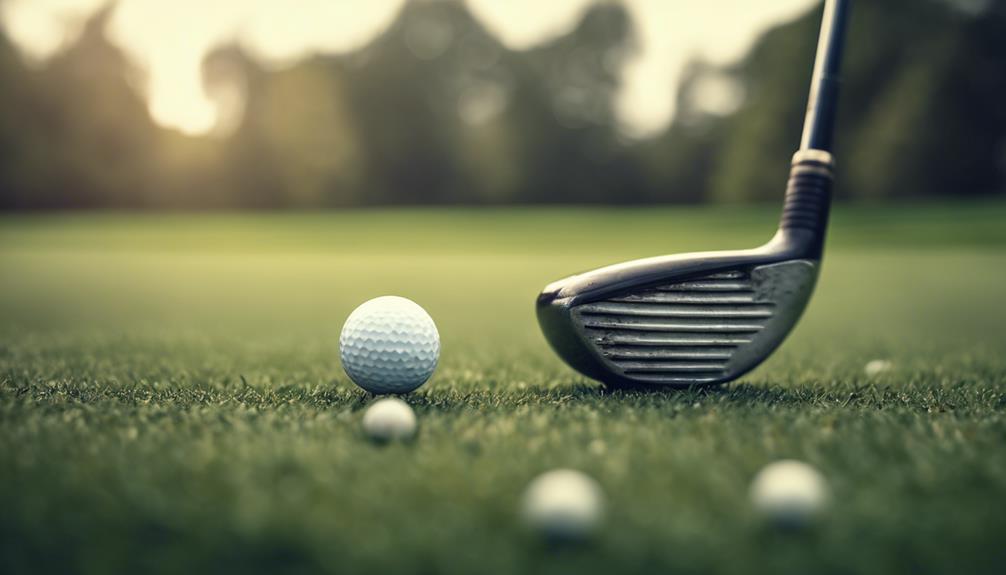
As you explore the legality of chippers in golf, you'll want to understand how they comply with chipper rules, ensuring you're aware of the regulations that govern their use.
You'll also need clarification on golf regulations that pertain to chippers, so you can confidently incorporate them into your game.
Chipper Rules Compliance
How do you ensure your chipper complies with the rules of professional tournaments?
To guarantee your chipper is legal, you need to pay attention to its design and features. According to USGA guidelines, the shaft of your chipper must be attached at the heel, not at the toe or center. The clubhead should have only one striking face, and circular grips are a necessity. In addition, the chipper's club face design must conform to USGA specifications to be considered acceptable in professional tournaments.
When it comes to tournament regulations, it's vital to verify that your chipper meets the required standards.
You can check the USGA's website or consult with a golf equipment expert to make sure your chipper is compliant. Remember, even minor deviations from the rules can render your chipper illegal, so it's important to double-check its features.
Golf Regulation Clarification
You can rest assured that chippers are explicitly permitted in professional tournaments, according to the rules of golf. This clarification eliminates any doubt about chipper tournament eligibility, allowing you to focus on your game.
As a standard club option, chippers are considered a legal choice for competitive chipper usage in professional settings. Pro golfers, in particular, have the freedom to include a chipper in their set of clubs, leveraging its strategic benefits in specific situations during tournament play.
The rules of golf explicitly state that chippers are legal, putting to rest any concerns about their legitimacy. This means you can confidently incorporate a chipper into your gameplay, exploring its potential to improve your scores.
With chipper preference varying among pro golfers, it's crucial to understand the rules governing their use. By doing so, you'll be well-equipped to make informed decisions about your club selection and optimize your performance on the course.
Legal Club Classification
The Rules of Golf specifically classify chippers as legal clubs, solidifying their place within the framework of golf regulations and allowing professional golfers to confidently incorporate them into their tournament play. As a golfer, you can rest assured that chippers meet the necessary standards for competitive use. The USGA and R&A, governing bodies of golf, don't prohibit the use of chippers in tournaments, further reinforcing their legality.
Chipper design, which typically features a more upright face and a shorter shaft, is intended to help golfers with higher skill levels master the art of chipping. By incorporating a chipper into your club selection, you can gain a competitive advantage, especially in situations where precision and control are vital.
However, it's important to remember that a chipper isn't a substitute for developing your overall skill level. You'll still need to hone your chipping technique to get the most out of this club. With a chipper in your bag, you can focus on refining your short game and taking your tournament play to the next level.
Perception of Chippers in Golf
Golf purists view chippers with skepticism, seeing them as a shortcut that circumvents the cultivation of nuanced chipping skills. You might perceive chippers as a way to bypass the hard work needed to master traditional shot-making techniques. This perception arises from the notion that using chippers can impede skill development, as you're not refining your skills through practice and repetition. Instead, you're relying on a specialized club to get the job done.
However, chippers do cater to different player preferences, offering a solution for those who struggle with traditional chipping methods. But, the debate surrounding chippers reflects differing opinions on their role in the game and their impact on skill development. As you weigh the pros and cons, consider that professional golfers rarely use chippers in tournaments, opting for conventional clubs that require more skill and technique.
Ultimately, the decision to use a chipper depends on your personal approach to the game and your priorities regarding shot making and skill development.
Professional Use of Chippers
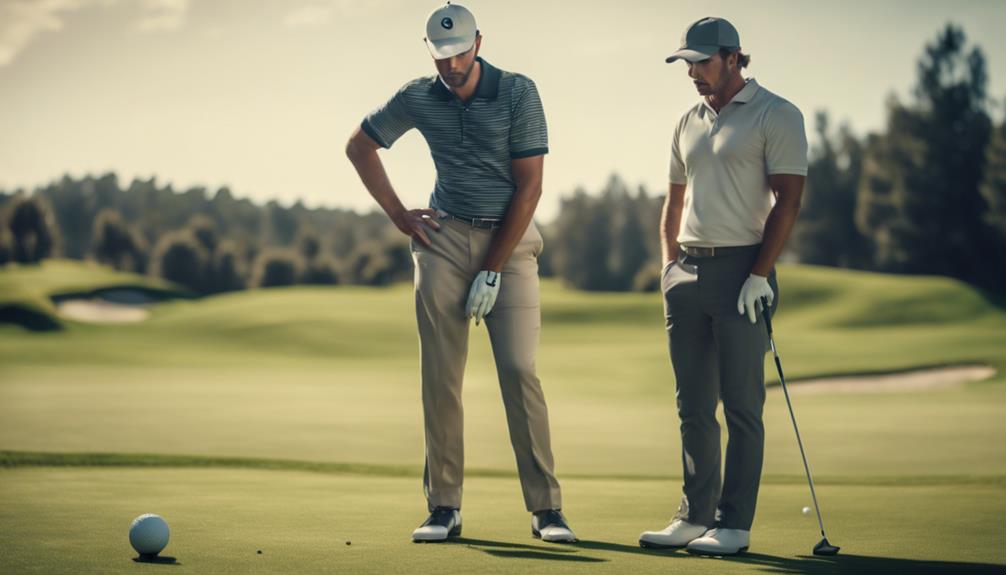
As you explore the world of professional golf, you'll notice that chippers aren't a common sight in tournaments. In fact, the acceptance rate of chippers among pros is remarkably low, and their usage prevalence is overshadowed by traditional clubs.
Now, let's examine the reasons behind this professional chipper stigma and what it means for the game.
Chipper Acceptance Rate
Rarely do you see a professional golfer pulling out a chipper during a tournament, and this scarcity is largely due to the sport's long-standing emphasis on honing traditional chipping skills.
While chippers are designed to make short game shots easier, they're not a popular choice among professionals. In fact, most prominent players opt for traditional clubs over chippers, demonstrating their preference for developing and showcasing their skills.
The chipper's lack of popularity is also attributed to tournament restrictions. Unlike long putters, which are more commonly used by professionals, chippers are rarely seen on the course. You won't find well-known golfers regularly using chippers in competitive events, as traditional techniques are prioritized over alternative clubs.
This lack of adoption contributes to the chipper's low acceptance rate in professional golf. As a result, you're unlikely to see a chipper being used by a pro during a tournament, highlighting the sport's commitment to preserving traditional chipping skills.
Chipper Usage Prevalence
You're unlikely to spot a chipper in a professional golfer's bag during a tournament, and this scarcity is reflected in the minimal adoption of these clubs among elite players. As you observe the equipment choices of top golfers, you'll notice that traditional clubs are the preferred tools for their short game. In fact, long putters are more commonly seen among professionals compared to chippers in tournament play.
The chipper's popularity among professional golfers is remarkably low, and its acceptance is limited. Elite players rarely rely on chippers as part of their equipment, and this trend is evident in competitive tournaments. You won't find many chippers in play during major events, and their usage isn't a prevalent trend. This lack of adoption isn't surprising, given the unconventional nature of chippers in professional golf circles.
As you assess the current state of chipper usage, it's clear that these clubs aren't a staple in the bags of top golfers. The elite players' preference for traditional clubs is a proof of their trust in time-tested equipment. While chippers may have their advantages, their limited professional acceptance and minimal tournament usage make them a rarity in the world of competitive golf.
Professional Chipper Stigma
As you explore the world of professional golf, you'll notice that chippers are rarely seen in competitive play. Professional golfers largely shun chippers in competitive play due to a lingering stigma surrounding their use, which is rooted in the perception that relying on these clubs is unorthodox and inferior to mastering traditional techniques.
Here are three key reasons why chippers aren't widely adopted by professional players:
- Chipper misconceptions: Many professional players view chippers as a crutch, believing that relying on them means you're not skilled enough to chip and pitch traditionally.
- Stigma impact: The negative perception surrounding chippers deters elite golfers from using them, fearing it may affect their reputation or be seen as unprofessional.
- Elite golfer perspectives: Top players prioritize honing traditional techniques over relying on chippers, which they see as a shortcut rather than a demonstration of their skill.
This stigma has contributed to the limited adoption of chippers among professional players, with many opting for traditional clubs instead. As a result, you're unlikely to see prominent professional golfers regularly using chippers in tournaments.
Debate on Chippers in Golf
The debate surrounding the use of chippers in golf sparks intense discussion among golf enthusiasts, with opinions sharply divided on whether these specialized clubs belong in the bags of professional players.
As you weigh in on this debate, you'll likely consider the role of chippers in developing chipping techniques. Some argue that relying on chippers can hinder skill development, as they provide an easy way out of tricky situations. Others believe that chippers offer a competitive advantage, allowing players to focus on other aspects of their game.
You might wonder why professional golfers rarely use chippers in tournaments, opting instead for traditional clubs. The answer lies in the stigma surrounding chippers, with many viewing them as a shortcut rather than a legitimate tool.
As you form your opinion, consider the nuances of the debate and the implications of allowing chippers in professional play. Will it level the playing field, or undermine the integrity of the game?
Frequently Asked Questions
Are Chippers Legal on the PGA Tour?
You'll find that chippers are technically allowed on the PGA Tour, but their effectiveness is often overshadowed by player preferences for traditional clubs, and rule changes haven't prompted widespread adoption.
Why Don't More People Use Chippers?
You've seen pros like Phil Mickelson masterfully chip with traditional clubs, but why don't more people use chippers? It's because they want to develop a consistent chipping technique, mental game, and practice drills, rather than relying on a shortcut.
How Far off the Green Can You Use a Chipper?
You can use a chipper as far off the green as needed, as long as you're not on the putting surface, with no specific distance limit, making chippers an effective option for strategic shots.
Are Two-Way Chippers Legal?
You'll be relieved to know that two-way chippers, with their reversible clubface design, offer a scoring advantage without compromising player preference, as they conform to USGA regulations, making them a legal and versatile option for your short game.
Conclusion
As you weigh the pros and cons of using a golf chipper, remember that the rules are clear: chippers aren't allowed in professional tournaments.
Like a referee's whistle in a football game, the USGA's regulations blow the play dead on chippers.
While some argue they're essential for beginners, others see them as a crutch that undermines the integrity of the game.
Regardless, one thing is certain: in professional golf, chippers are a non-starter.




